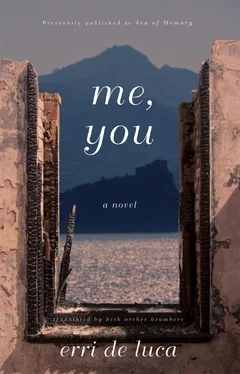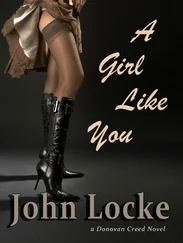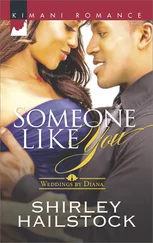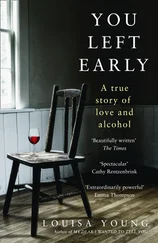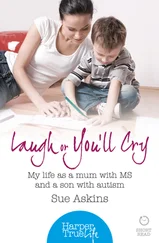Her voice made no attempt to be heard, it was very low, but she knew I would hear her. Without changing position on the stone ledge, I leaned back, clasping my hands behind my head.
“Dancing looks like a race to me, everybody rushing to get caught.” I invented this idea so as not to remain silent after her remarks, to prove that I had heard her, that I would always hear.
“Is that why you don’t dance, so as not to be caught?” she shot back with a smile. “I’ll catch you now.” And she stood up, pulling me by the arm.
I tried to resist. They’d only laugh. I didn’t know a single dance step.
“If you can stand up in a boat, you can dance.”
I didn’t try to argue that it was the contrary, that balance on the sea was a resistance to swaying, to losing one’s footing. I said to her in my final entreaty, “Everybody wants to dance with you. If you take a turn with me you’ll make them hate me. As it is, it’s a lot for them to have a kid hanging around.”
“You’re not a kid, you’re an old man, you’re ancient, another generation. I dub you my knight of old.”
She pulled so hard I couldn’t resist without hurting her. I went to the record player and put on a slow song. She took me by the hand, placing my other one behind her back, and led me into the music. The others took advantage of the record to do the same.
“Why did you say I’m an old man?” I asked her, surprised by the deep timbre that issued from my throat.
“You’ve suddenly become an old man in a marvelous way. You are someone who has come from far away, like me, someone who has disembarked in a new land, has gray hair, and wonders how he is going to get along.”
The bite of the moray had left a pattern of holes: a pale letter on dark skin. Her hand was right on that spot and it was the most intimate gesture I had ever experienced with a woman. She was touching the surface of a pain, in a clasp as capable of reviving it as assuaging it. I’m here, her hand said, holding the wound for the duration of the song. I’ll go with you far away and hold your pain in my hand.
I yielded to her willful grasp on the bite, barely swaying, less than on a boat at evening. She held me in her arms, without squeezing, in a light but firm hold. I followed, and inside of me another age took place, remote, beyond time. I became what she saw in me and wanted me to be. Chaie, Chaiele, her name beat in my head to the rhythm of the music, of our feet as they brushed each other in a turn. I could hear the waves crashing against the rocks; her name resounded in the roar. Her breath fell against my wrinkled collar. I was no longer a kid next to her. Chaie, Chaiele was the breath of everything around, as though speaking her name, and I heard it inside my head like a beat to keep me from losing my step: Chaie, Chaiele.
“What did you say?” she asked, stopping abruptly and backing away from me. “What did you say?”
Nothing. I didn’t think I said anything.
“No, you said … you called me … what did you call me?”
I didn’t reply. She stood still in front of me, her voice tense with anger, a frightened look in her eyes. I couldn’t have said her name, I couldn’t. Somebody changed the record, putting on something wild and noisy. Caia pulled me by the arm outside the dance area and said furiously, “Don’t you ever call me by that name again, ever!” Her voice broke on each word. I must have been looking at her with stricken eyes, like an innocent victim, like an old man. She pressed her lips together and swallowed hard. “Go get me something to drink. No, never mind, I’ll go myself.” And she walked away.
I went back to the ledge for a while, then went out to the rocks, heading home. The music grew fainter, at last overwhelmed by the sea, and then I could say out loud my “Chaie, Chaiele.” It was my natural voice again, not that shadowy voice that came out of me when I was close to her. My own voice could not have betrayed the secret by speaking her name; it was saying it now, for the first time, at the edge of the sea. Could the touch of her arms have confused me to the point of not knowing whether I was speaking or not? Chaie, Chaiele. Nicola was right, except for the question of awareness: Caia knew who she really was in the midst of others, and who were her intimates.
For a few days I didn’t join Daniele or even go fishing much. Uncle had guests on the boat. In the afternoon I stayed longer than usual at Nicola’s, hearing about the trip and what they caught. It was the time of Uncle’s vacation and Nicola went out every night to drop the baited lines. He would return home and sleep a few hours before meeting Uncle on the beach and going out with him to bring in the lines. They caught an occasional grouper, more often congers and morays, a few scorpion fish, starfish, even gulls, who followed the boats despite the darkness and dived at the lines, getting caught on the hooks and dragged to the bottom. Once we caught a sea turtle but Uncle put it back after an exchange of knowing glances with Nicola. We saw it swim toward the bottom with leisurely strokes, not at all in frantic flight.
September was nice, when you go trolling for tuna, sea urchins, needlefish, and there isn’t all that work needed for multi-hook rigs. I stood beside Nicola and did the easiest part, which was to arrange the hooks by attaching them to the edge of the cork while he fed me the line and then coiled it into a basket. And we got around to talking, picking up where we had left off the last time. All around us the other fishermen were doing the same thing helped by young boys. Nicola’s sons were still too little. The village houses stood on the shore facing the beached boats. The fishermen helped each other pull in a boat or drag it into the water without having to ask. The air was filled with the shouts of children and the stench of bilgewater mixed with a powerful smell of tar and a touch of diesel fuel that leaked from the motors. A fisherman’s life was not purely natural, but combined the crafts of a carpenter, a mechanic, a tailor, and only in deep water, at the very end of his work, came the fish and the tools for catching them.
There was always something to be done and dusk fell as we stood side by side, facing the sea, while the light dimmed to darkness between our hands. The fishing village caught the last rays. I told him he was right, that he had known the Germans and I the Americans, he the war and I the slow discovery of having been born in a city that had sold itself. The Americans were the bosses, not the criminal tyrants he had known, just the bosses. The mayor was their spokesman, the port was their dock, the bay was crawling with fleets of their ships, aircraft carriers, submarines, cruisers, and the city was the playground for thousands of foreign sailors and soldiers, the masters of the field. The city was the largest bordello in the Mediterranean. They urinated all over the place, which I saw as their mark on our territory.
Our police were powerless during the landings. They had their own police, their own neighborhoods, their own stores, vehicles, movies. Nicola listened without understanding the shame I felt at having that American in my home. They were there because they had liberated us, but in Naples they never finished with their liberation. In the rest of Italy no other cities were held by the Americans, but Naples had become the wartime capital of the southern Mediterranean. They were in command and we were just one of many military ports of call, held on to for strategic reasons. That year I suddenly felt ashamed for my sold-out city.
“Do you hate the Americans?”
No, Nicola, they’re just doing their job, sniffing a little at the stink of us Latins. They run around looking blank or else suspicious, and if you see any other expression in their faces it comes from alcohol. I hate the Germans without ever having seen them in uniform, as you did, and I hate the officials who govern my city which they presented with thighs wide open to the sailors. Nicola admitted to having hated the Germans, but not anymore.
Читать дальше
